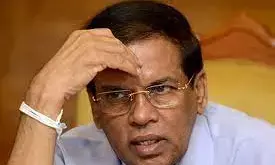Sri Lanka: Court Directs Sirisena to Compensate Bomb Blast Victims
Ex President,four officials ignored warnings of attacks by Islamic radicals

A seven-member bench of the Sri Lankan Supreme Court on Thursday ordered former President Maithripala Sirisena and four other top security officials to pay compensation totaling LKR 310 million to the victims of the April 21, 2019 Easter Sunday bomb blasts set off by Islamic radicals.
More than 250 people, including women and children, were killed in churches and hotels in Colombo and other parts of the island.
While President was ordered to pay LKR 100 million, former police chief Pujith Jayasundara and the former State Intelligence Service (SIS) Director Nilantha Jayawardena were each ordered to pay LKR 75 million, former Defense Secretary Hemasiri Fernando was ordered to pay LKR 50 million and former National Intelligence Director Sisira Mendis was ordered to pay LKR 10 million from their personal money.
In addition, the judgment also states that the government should pay LKR 1 million in compensation to the victims.
The court said that Sirisena and other officials had violated the Fundamental Rights of the 12 petitioners by failing to take action to prevent the blasts, despite receiving sufficient intelligence about the possibility of the attacks.
The court said: “It would appear that under the presidency of the former President Sirisena, National Security Council (NSC) meetings were sporadic and not regular. If one were to formulate policies with regard to national security and exercise supervision over the security echelons of the Government, the NSC was a useful tool in the hands of the President, but a notorious misappreciation of the duties and functions of the Minister of Defense has led to an appalling lack of appreciation of the importance of the National Security Council.
“The dangers posed by Zahran and his terrorist outfit could have been effectively appreciated and dealt with had this mechanism been in place but its efficacy had been lost on the then President.”
President Sirisena was simultaneously the Defense Minister. And Zahran was the ring leader of the suicide bombing squad.
The court observed that there had been Islamic radicalization in Sri Lanka since 2015. As regards the April 21 2019 bomb attacks, there had been tip offs more than once since April 4, 2019 about churches being possible targets of attacks. But the intelligence agencies sat over the information which had been given in writing also.
Here are some key points from the order:
“This dismal failure on the part of the former President Sirisena resulted in disastrous consequences for this country and not only lives were lost and properties destroyed but interracial tension and inter-ethnic hatred began to raise their ugly heads causing the very fabric of this nation to be broken and become fragile.”
“There were fear psychosis, apprehension and inter-ethnic alienation that were palpable through the length and breadth of the country. The due care with which the Minister of Defense must have exercised his wide powers in the greater good of the country was totally non-existent.”
“Before we proceed to summarize the compensation payable and part with the judgment, we must express our shock and dismay at the deplorable want of oversight and inaction that we have seen in the conduct of affairs pertaining to Security, Law and Order and Intelligence. There are glaring examples of a lack of strategic coordination, expertise and preparedness that need a critical examination as to the way forward.”
“The failures that eventuated in the Easter Sunday attacks and the concomitant deaths and devastations have left behind an indelible blot on the security apparatus of the Country and this Country which is blessed by a multi-cultural and multi religious polity cannot be left to the vagaries of these follies and made to suffer leading to violence, fear, apprehension and uncertainty.”
“These events must recede into oblivion but they remind us starkly of the necessity to effect legislative, structural and administrative changes.”
“It is evident from the evidence placed before us that there is an urgent need to place the National Security Council (NSC) on a statutory footing and its composition specified with clarity so that there are no maneuvers to manipulate hostile exclusions and selective inclusions.”
“The affidavit testimonies and the large volume of documents we have perused highlight the necessity to revamp the security systems and intelligence structures so that the expanding threats of terrorism and emerging challenges could be nipped in the bud and arrested as this Country cannot descend into anarchy once more.”
“The course of conduct we have scrutinised, demonstrates a woeful lack of expertise in intelligence gathering and dissemination among important individuals entrusted with the task. For instance, the office of Director, SIS and CNI must be occupied by individuals with necessary skill and expertise and the conduct of the Respondents who held the office, upon receiving sensitive intelligence, shows a lack of awareness and understanding of strategic vision.”
“We recommend that the duties and functions of the office of Chief of National Intelligence (CNI) must be stipulated with definite certainty and the office should be occupied by a person having the necessary expertise, training and qualification.”
The seven-member Supreme Court Judge bench comprised Chief Justice Jayantha Jayasuriya, Justices Buwaneka Aluwihare, L.T.B. Dehideniya, Murdu Fernando, S. Thurairaja, A.H.M.D. Nawaz and Shiran Gunaratne.



